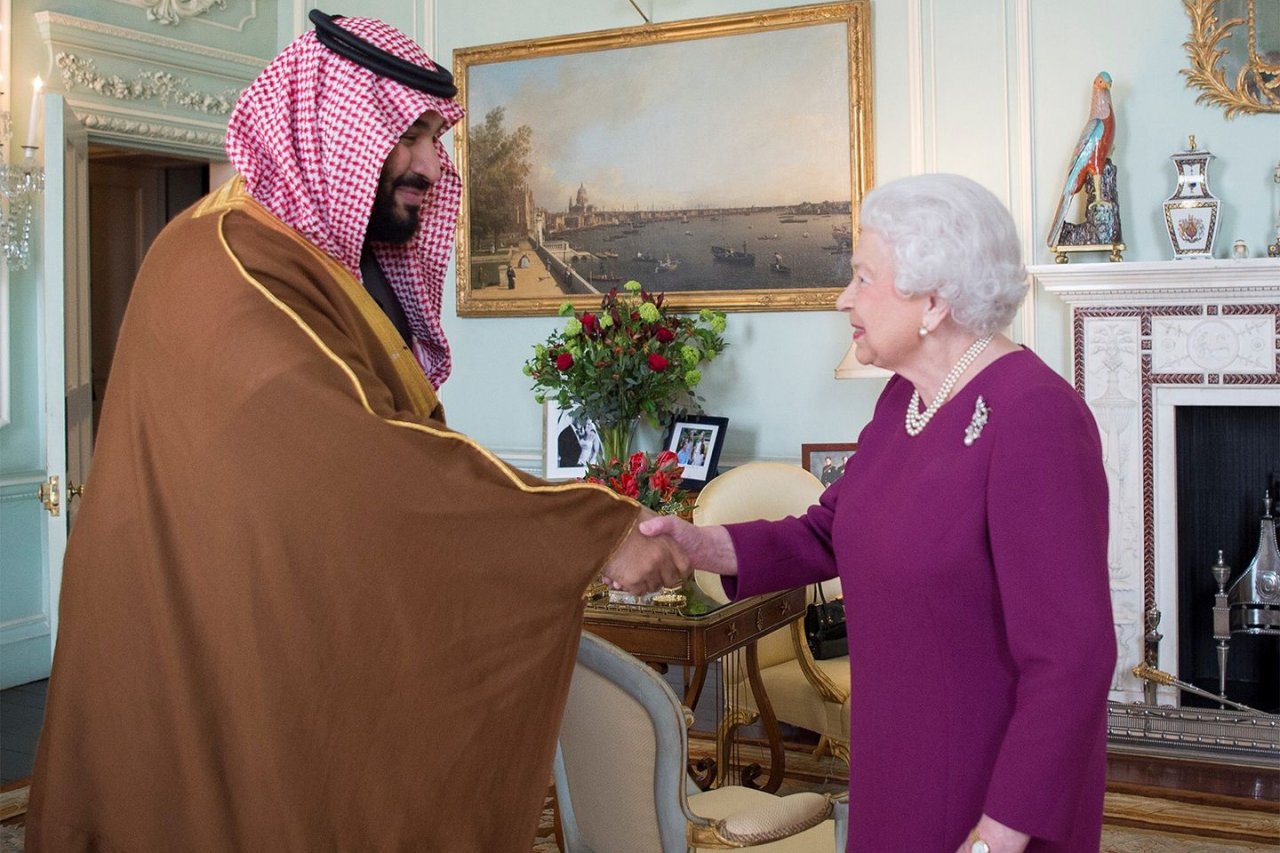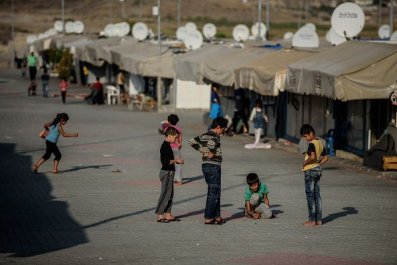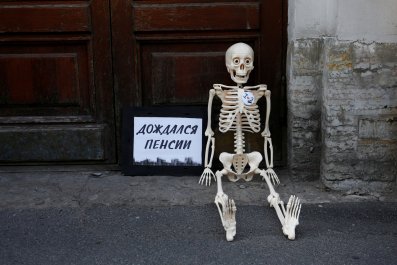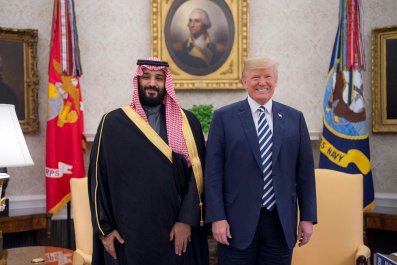The crown prince knows how to please. In early March, Mohammed bin Salman, commonly known as MBS, was at Buckingham Palace for lunch with Queen Elizabeth II. It was the first official visit for the 32-year-old, and press coverage was glowing. "He's a revolutionary!" proclaimed The Daily Telegraph. British conservatives loved MBS's proposal to privatize Saudi Aramco, his state's oil company, and list it on the London Stock Exchange—a nice boost to the flagging British economy, as well as his reputation as an economic reformer.
Later that month, he was in the Oval Office with President Donald Trump, followed by stops in Los Angeles, New York, Houston, Silicon Valley and Seattle to meet with Hollywood and tech elite—including Oprah Winfrey, Elon Musk and Google executives.
This grand tour marked the crown prince's international debut. His 82-year-old father, King Salman, ceded some of his own power last year, commending Vision 2030, MBS's plan for social and economic liberalization. In the crown prince's public statements, at least, he endorses the view that Saudi Arabia cannot survive forever on checkbook diplomacy abroad and government welfare at home. The goals include lessening the country's dependence on oil exports; investing in education, entertainment and tourism; and invigorating the economy—in part by supporting women in the workforce. A decree permitting women to drive, which went into effect in June, bolstered his international image as a reformer.
The arrest last November of a dozen of his royal relatives and ministers accused of skimming on their government deals was reported internationally as an anti-corruption housecleaning—one that added an estimated $100 million to the funds under the prince's control. (All told, the House of Saud is worth over $1 trillion.)
The prince's world travels and moves to burnish his carefully constructed "progressive" profile marked an aggressive effort to tackle one of the kingdom's key problems: Saudi Arabia's image has never fully recovered from 9/11. The attacks were carried out mostly by Saudi citizens. A declassified 2016 congressional report—which the Saudis went to great lengths to suppress—alleged that the terrorists may have had support from individuals connected to the Saudi government, and a 2009 cable from then–Secretary of State Hillary Clinton said, "It has been an ongoing challenge to persuade Saudi officials to treat terrorist financing emanating from Saudi Arabia as a strategic priority."
The crown prince's own strategic priority is to bury this narrative by pivoting to a new one, that of a Westernized, consumerist nation hungry for American investment—and weapons to confront common enemies. He played the role with impressive élan, eschewing traditional Saudi royal garb for much of his U.S. trip, even wearing jeans to meet Facebook CEO Mark Zuckerberg.
At each U.S. stop, MBS was heralded by the media. Fox News gushed over his "modernization push." CNN called Saudi Arabia "the hottest emerging market right now." American Media Inc. (owned by Trump pal David Pecker) published an entire $14 magazine devoted to the crown prince.
Reporters failed to ask about Saudi Arabia jailing women, such as Samar Badawi and Nassima al-Sadah, who had campaigned for the right to drive, and dozens of other civil rights activists. Nor did they ask about the humanitarian disaster that is his war in Yemen, or how the hundreds of millions the crown prince has spent in the recent past on personal possessions fits with his narrative of responsible economic reform.
"The Saudis have used all their resources to suffocate any democratic impulse in the Arab world," says professor Madawi al-Rasheed, a Saudi anthropologist who has written several histories of the kingdom. For all of the reformist hype, MBS leads an authoritarian regime that brooks no dissent.
Raif Badawi, an atheist blogger, remains in jail, along with his lawyer and prominent human rights activist Waleed Abulkhair. Noha al-Balawi, a women's rights campaigner who posted videos challenging Saudi Arabia's normalization of ties with Israel, was arrested in February. Saudi prosecutors have called for the beheading of another female human rights protester, Israa al-Ghomgham, for participating in peaceful protests; she has been imprisoned for 32 months without access to a lawyer. Meanwhile, preachers who spread a radical theology sanctioning the killing of Shiite Muslims, Christians and Jews remain in senior position of influence, and the puritanical Wahhabi ideology that has fueled extremism across the Muslim world continues to be a major Saudi export.
There's another long list of Shiite victims in the oil-rich Eastern Province, who have been tortured, executed or have simply disappeared "because their ideas are dangerous to him and no criticism is tolerated," says Rasheed.
Democracy is not on the crown prince's agenda. Indeed, he personifies the counterrevolution that extinguished the democratic flame that flickered briefly during the Arab Spring. He and allied strongmen across the Middle East have moved ruthlessly to reinvigorate an authoritarian regional order with Riyadh and its core Wahhabi ideology.
In other words: Make Arabia great again.
To understand MBS's impressive command of public relations, you must begin in Abu Dhabi, the capital of the United Arab Emirates. In the Western imagination, the UAE is synonymous with Dubai's glass-and-steel skyscrapers, luxury shopping malls and indoor ski resorts. Less familiar is its crown prince, Mohammed bin Zayed al-Nahyan, or MBZ—and that is exactly how he likes it.
Described in a U.S. diplomatic cable as "charismatic, savvy and very comfortable in the West," he was Washington's preferred candidate for the throne when his brother, Khalifa, succeeded their father. But his brother's own illness has made MBZ the UAE's de facto ruler and military chief for at least a decade.
The 57-year-old former pilot rapidly expanded the UAE's military spending and defense industry. The country is now one of the world's most militarized nations. But thanks to MBZ's aggressive manipulation of the media, the common perception is that the UAE is an open, tolerant multicultural force for progress—a lesson in image-making that his protégé, MBS, has clearly absorbed.
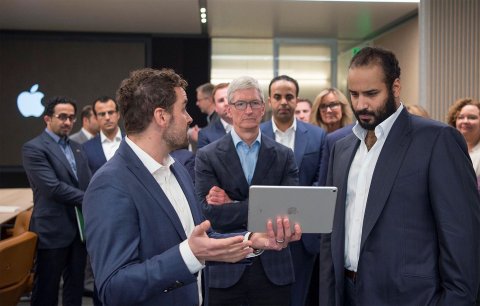
In late 2010, the Arab Spring revolutions began in Tunisia and quickly spread to Egypt. MBZ, terrified by the possibility of democracy sweeping the Middle East—and bringing to power the Muslim Brotherhood, the largest political movement in the Arab world—argued that pro-democracy protesters were intent not on reform but on imposing Sharia, Islamic law. D.C. firms the Harbor Group and the Camstoll Group aided his extensive lobbying campaign.
By 2012, the UAE's minister of state for foreign affairs, Anwar Gargash, was giving private briefings to Western journalists, describing the UAE as an island of stability and tolerance within a dangerous and volatile neighborhood. The state-run National Media Council aggressively criticized Egypt's Brotherhood-led government, elected in the country's first free and fair elections, in 2011.
Unwilling to accept the verdict of Egypt's electorate, MBZ launched an aggressive effort to restore military rule to power in Cairo. The protests that set the stage for Egypt's 2013 coup were led by the Tamarod (Rebel) movement. It appeared to be a grassroots group, but it was heavily funded by the UAE.
The coup put Abdel Fattah el-Sissi into the presidency, and he quickly suspended the constitution. A month after the coup, Sissi directed the massacre of nearly 1,000 peaceful pro-democracy protesters and Brotherhood activists at Rabaa Square. By May 2014, there were close to 41,000 political prisoners in Egypt's jails. Washington and London had initially supported democracy in Egypt, but their response to Sissi's state-orchestrated violence was muted.
But Sissi's bread was buttered elsewhere. In leaked recordings of 2014 calls between one of MBZ's key lieutenants, Sultan al-Jaber, and the Egyptian General Abbas Kamil, Sissi's man can be heard pleading for access to more Emirati money to help the new dictator manage a failing economy.
Similar methods were used to undermine Tunisia's democracy. Television channels owned by UAE-friendly oligarchs broadcast accusations that Ennahda, the party that won Tunisia's first free elections, in 2011, was part of a Brotherhood conspiracy to impose Islamic law. (Ennahda remains in power.)
At home, the UAE has clamped down on the local Muslim Brotherhood affiliate, Al-Islah, labeling it a terrorist organization. In 2013, a total of 94 Emirati activists—including lawyers, judges, bloggers, students and a prince—were jailed on conspiracy charges.
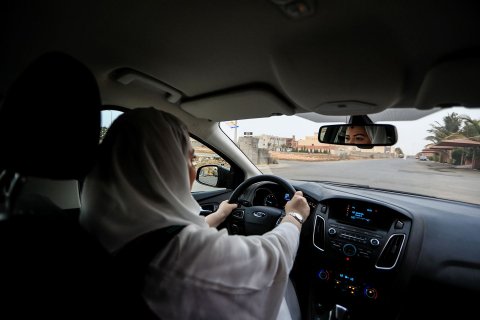
In 2015, the death of the Saudi King Abdullah, grandfather of MBS, gave MBZ his most dramatic opportunity to eclipse the old model of Gulf diplomacy—demure, cautious, primarily concerned with presenting a united front. MBS had spent time with MBZ since his teens, and the older Emirati princeling had groomed the young Saudi. The two share an impatience at the perceived timidity of their parents' generation and sought a more aggressive response to regional challenges. But to MBS's more belligerent instincts, MBZ added the finesse of charming the West, deploying lobbyists and PR firms to perpetuate the view of the UAE and Saudi Arabia as the enlightened leaders of the Arab world, facing down the Brotherhood and Iran.
Years of lackadaisical investment in PR ended with the ascension of MBS. By 2016, Saudi Arabia was employing 10 lobbying firms being paid an estimated total of $1.3 million a month, the political website The Hill reported. One of them, King & Spalding, had the job of attempting to soften a law, the Justice Against Sponsors of Terrorism Act, that would allow the families of 9/11 victims to sue the Saudi government. A $90,000 contract with Capitol Media Group, a firm which has worked on several Islamophobic media campaigns, was subcontracted by another, Qorvis, to bring dozens of U.S. military veterans to Capitol Hill to speak against JASTA. The bill was passed, overriding a veto attempt by President Barack Obama.
For MBS's visit to London in March, billboards and full-page newspaper ads were accompanied by a more secretive bid to buy influence. An independent nonprofit called the Bureau of Investigative Journalism revealed that one of the kingdom's London firms, Consulum, had a serving senior British diplomat working on the Saudi account—shilling for the dictator on the British taxpayers' dime. And the parent company of the disgraced Cambridge Analytica, SCL Group, had helped MBS's team identify the sections of Saudi society likeliest to rise up against him.
If anything, the PR offensive has escalated as conditions at home become more repressive. Dozens of dissidents and driving-rights campaigners remain in prison, and one of the most prominent, Loujain al-Hathloul, joined them in May. Saudi women still can't travel without the permission of a male guardian, and fathers or brothers can use their guardianship privilege to forcibly separate their daughters or sisters from their husbands. Ali al-Ahmed, a Saudi exile and director of D.C.'s Institute for Gulf Affairs, says Saudi women have been reduced to slavery by the absolute monarchy.
And then there's Yemen. MBS as defense minister, in 2015, became what the Brookings Institution called "the face of Yemen's war." Saudi Arabia led a coalition mounting a massive air campaign against that country's Houthi rebels, whom Riyadh sees as Iranian proxies. The war in Yemen has claimed many thousands of civilian lives, infected more than 1 million people with cholera, and could put 18 million people on the brink of starvation. And despite creating the world's largest current man-made humanitarian catastrophe, the Saudis have failed to impose their will on the battlefield.
According to an Associated Press investigation, the Saudis and the UAE also cut a secret deal with Al-Qaeda fighters in Yemen, letting them retreat with weapons, equipment and almost $100 million in looted cash. Many of these fighters were recruited directly into the Saudi coalition forces, a deal that strengthened the most dangerous branch of the extremist network that carried out the 9/11 attacks. U.S. officials estimate Al-Qaeda numbers in Yemen at 8,000 members and rising. (The Al-Qaeda partnership bears an eerie resemblance to the Saudi and mujahedeen alliance in Afghanistan during the 1980s, which originally gave rise to Al-Qaeda.)The catastrophic war—and rumors of shady arms deals—have made even steadfast Saudi allies queasy. The European Parliament voted in 2016 for an EU-wide arms embargo against Saudi Arabia; Norway has also suspended arms sales to the Emirates.
Even Washington's support is wavering. In March, a bipartisan effort led by Senator Bernie Sanders managed to get 44 out of 100 U.S. senators to vote for an immediate end to U.S. backing of the Saudi war effort. They have vowed to try again.
It's not the sort of publicity MBS is seeking, of course. Nothing disrupts a princely charm offensive like images of Yemeni children killed by a U.S. missile fired by a Saudi coalition war plane.



